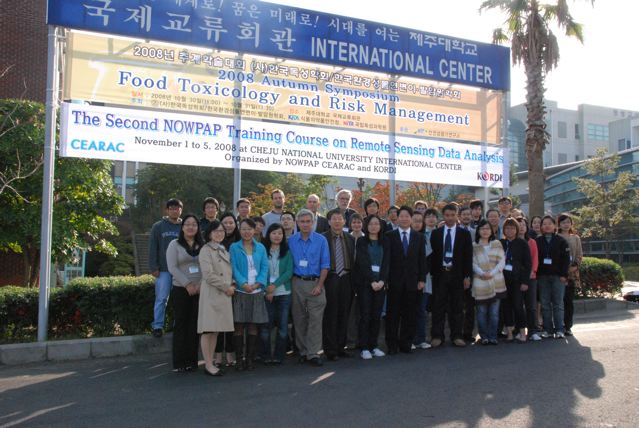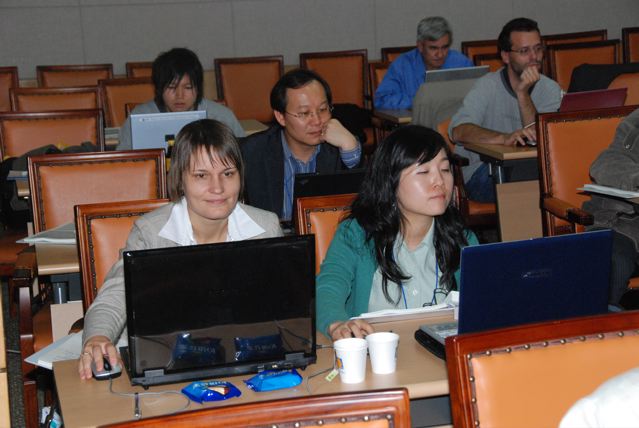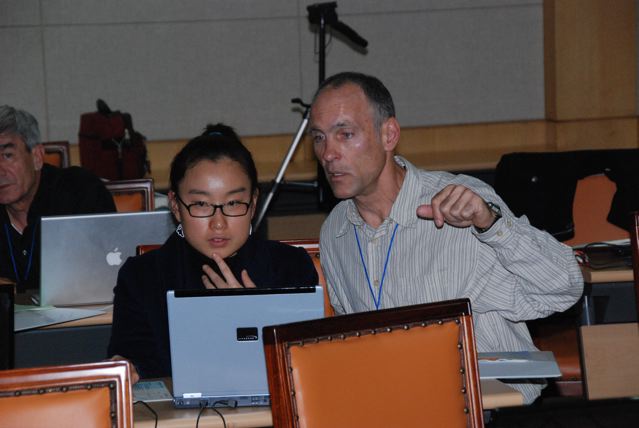Report on the Second NOWPAP Training Course on Remote Sensing Data Analysis
1-5 November 2008 at Jeju, Korea
Introduction
The Second NOWPAP training course on remote sensing data analysis was organized by the NOWPAP Special Monitoring & Coastal Environmental Assessment Regional Activity Centre (CEARAC) and the Korea Ocean Research & Development Institute (KORDI) at Cheju National University (Korea) on1-5 November 2008.
The training course was conducted for 23 selected trainees (Appendix 1), including postgraduate students, professional researchers and local government officers working in the field of marine sciences, from China, Japan, Republic of Korea, Russian Federation, France and Thailand. 12 lecturers from the NOWPAP countries (China, Japan, Republic of Korea and Russian Federation) and Germany, India and USA delivered lectures on remote sensing applications for monitoring and assessment of the marine and coastal environment in the Northwest Pacific Region. (Appendix 2).
Objectives
To conduct an intensive training course on remote sensing data analysis for students, young researchers and coastal managers to obtain useful skills and knowledge to utilize remote sensing data in monitoring and assessment of marine environment.
Date and Venue
The date and venue of this training course were as follows:
- Date; November 1 to 5, 2008
- Venue; Cheju National University, Jeju, Korea
Organization Structures
The training course was operated under the following organization structures:
- Organizer :
Special Monitoring & Coastal Environment Assessment Regional Activity Centre (CEARAC) - Co-organizer :
Korea Ocean Research & Development Institute - Supporters :
IOC Sub-Commission for the Western Pacific (IOC/WESTPAC)
Japan Aerospace Exploration Agency (JAXA)
Ministry of the Environment, Japan
Oceanographic Society of Japan
North Pacific Marine Science Organization (PICES)
Remote Sensing Society of Japan
UNDP / GEP Yellow Sea Large Marine Ecosystem Project
Course Fee
Training course was provided for free of charge. However, the cost for traveling and accommodation was borne by participants themselves except for some funded participants by the NOWPAP Fund.
Course Outline
Topics of the training course to be addressed included the following:
- Lectures;
Introduction to ocean color remote sensing
Remote sensing application for eutrophication
Estimation techniques of Chlorophyll-a concentration by remote sensing
New approach of ocean color remote techniques: Neural network
Atomosheric correction
Monitoring of coastal and marine environment by multi sensor approach
Introduction of satellite data distribution system
Introdution to ocean monitoring activities by remote sensing in Korea - Hands-on practice sessions;
Basic digital image processing
Level 2 data processing
Validation of remote sensing data
Time series analysis of ocean color data
Introduction to SeaDAS
Case study report
Conducting time series analysis by groups
Detailed course program are attached as Appendix 3.
Training texts
Please click the below link to the training texts distributed duringthe course.
Training texts for the second NOWPAP Training Course on Remote Sensing Data Analysis
Course Evaluation
On 5 November 2008, the evaluation report on the training course was submitted by the most of the participants. This evaluation report was constituted by questionnaires prepared by the organizers. The overall consensus was that the students learned a lot in a short period of time, the course was well arranged and also provided a great opportunity for participants to form network with specialists in the filed.

A group photo taken at the opening.


Snapshots during the hands on practice.
![NOWPAP CEARAC [UNEP]](../../../images/common/header_logo.png)